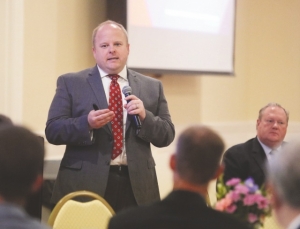Leaders in health care talk changes, care
By Steve Herring
Published in News on April 27, 2018 5:50 AM

News-Argus/CASEY MOZINGO
Cody Hand, senior vice president of government relations and deputy general counsel for the North Carolina Health Association, discusses issues affecting health care in the state and region during the annual Health Care Hot Topic Luncheon hosted by the Goldsboro Wayne Chamber of Commerce at the Goldsboro Event Center.

News-Argus/CASEY MOZINGO
Janie Jaberg, president and CEO for Wayne UNC Health Care, talks about what the hospital is doing to keep up with changes in health care during the luncheon.
When the General Assembly convenes next month it will consider two bills that will have major impacts on the health of the community and Wayne UNC Health Care, said speakers at Thursday's Wayne County Chamber of Commerce's hot topics luncheon on health care.
Senate Bill 630 would move behavioral health patients out of the emergency room and into more appropriate treatment centers, while House Bill 403 would change how those patients are considered under Medicaid.
Cody Hand, North Carolina HealthCare Association senior vice president, discussed the changes health care has already undergone, expected changes, how they will impact North Carolina and what residents can do as a community to become more engaged in the legislative process.
Wayne UNC Health Care CEO Janie Jaberg devoted her portion of the program to talk about growth at the hospital and its focus in patient care first.
What happens in Raleigh and Washington, D.C., impacts health care in Wayne County, Hand said.
That is particularly true as new legislators enter office, when policies will be reviewed and new agendas come forth that likely will affect the community, he said.
And right now, the political climate is rough, said Hand, who also is the association's lead lobbyist coordinating advocacy on behalf of North Carolina's hospitals before all three branches of state government
It is important to vote, especially in mid-term elections that often lack the draw of a presidential election year, he said.
When the General Assembly convenes next month, most of the focus will be on budget and cleaning and mopping up from the long session, Hand said.
For the most part, only bills that made it through one of the chambers during the previous session will be eligible to be brought up, he said.
"Senate Bill 630 will address a problem that we see on a statewide basis, but I know you guys see it much more here because of your location in the proximity of Cherry Hospital," Hand said. "Senate Bill 630 will help us figure out ways to get our behavioral health patients out of the emergency room and into a place where they can actually receive treatment."
The bill would be a saving grace for the county, Jaberg said.
There were nearly 70,000 patients seen in the hospital's emergency department last year, many of them behavioral health patients, she said.
"They need our help, but it is really hard to treat those patients when there are maybe four, or six or nine of those patients in our emergency department," she said.
And they are there for hours, if not days, she said.
Wayne UNC Health Care is not alone -- every hospital in the country is experiencing the same problem with behavioral health patients flooding into emergency rooms, Jaberg said.
Hospitals do their best to take care of those patients, but the emergency room is really not the best place for those patients, Hand said.
An emergency room is not a place of peace and calm and it is not meant to be because it is a place where people are saved, he said.
"We have to make sure that our actions in the ER are for those who really it is life or death," Hand said. "That is not a place where they can help. It is not a place where they can calm down, can't get out of that crisis mode."
Senate Bill 630 would change the involuntary commitment process to make sure the person is in a safe location and ensure they can't harm themselves or anyone in their community, he said.
The goal is to make sure that behavioral health patients get through that process faster so they receive treatment faster, hand said.
"It also ensures that if there is a location in the community that is meant to treat psychiatric crises that they go there and not by default the ER," Hand said.
That means when someone calls 911 or law enforcement, the person is not taken to the emergency department unless they have a physical injury, he said.
Instead, if there is a crisis center with a psychiatrist, the patient would be taken there for treatment, Hand said.
The intent is to get patients to care and to relieve pressure on the emergency department to concentrate on physical health issues faster, he said.
It also would identify areas in a community that lack services to treat behavioral health patients including those with substance abuse issues, he said.
"It will be better on patients. It will be better on the system," Hand said. "I think our General Assembly understands that, and they are helping us get this across the finish line. We are told by our House colleagues this will be done during the first few weeks of session.
"We need this to happen because Wayne Health needs a place for these patients to go and not languishing in an ED," Hand said.
Things are a bit tense between the House and Senate on House Bill 403, which is now in conference and concerns Medicaid, he said.
A change was made some years back in which people enrolled in Medicaid were moved into what are essentially health management organizations, he said.
However, behavioral health patients were not included in that move.
"What that means is somebody who may have a bout of depression, and need a little treatment for that, is going to be lumped in the same class as someone who is persistently severely mentally ill," Hand said. "That is not good on the Medicaid program. That is not good on cost. It is not good on the system."
The bill would move those people into a standard Medicaid plan so they can get good physical health care and mental health care at the same time, he said.
Both bills are moving the state to a point where health is not divided into mental and physical issues, but would rather be whole person health, Hand said.
